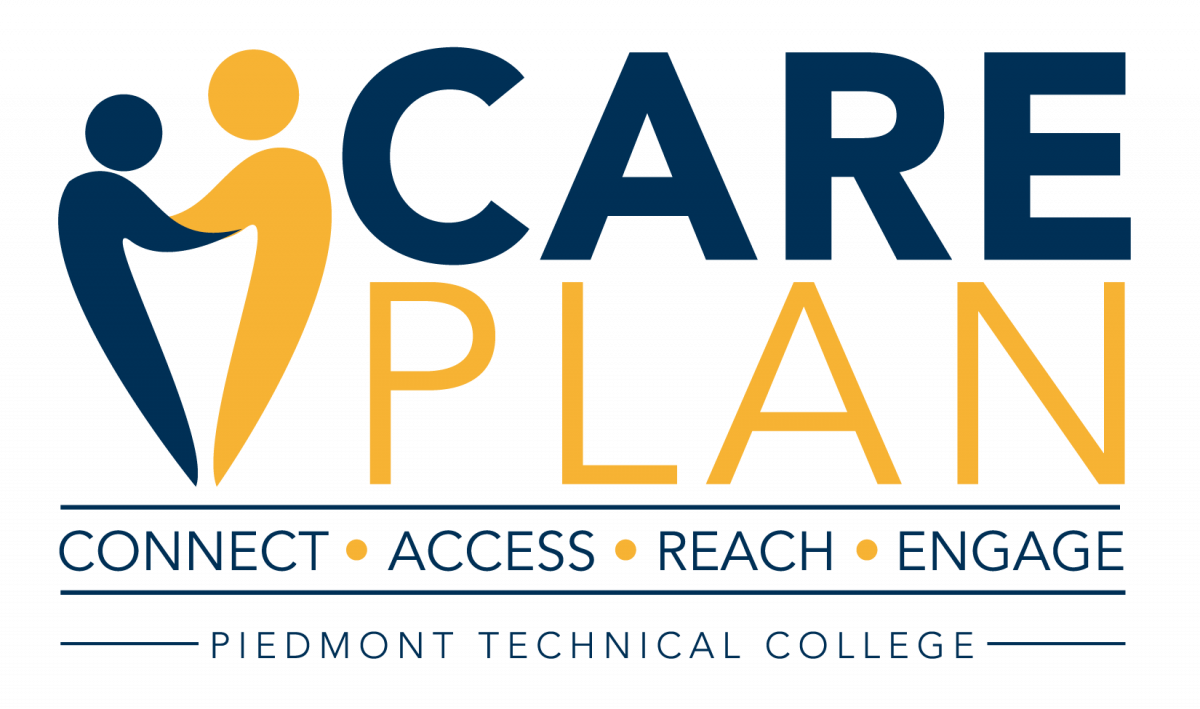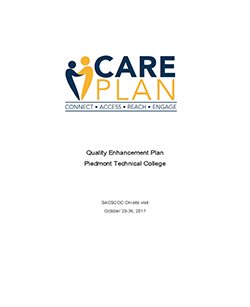The CAREplan
 A cornerstone of the mission at Piedmont Technical College is to transform the lives of students by providing the access and support needed to attain their career and educational goals.
A cornerstone of the mission at Piedmont Technical College is to transform the lives of students by providing the access and support needed to attain their career and educational goals.
The CAREplan has been developed to further that mission by providing a strengthened advising platform for students in the pre-program phase of health science and nursing programs.
What is the CAREplan?
The CARE Planning Center provides advising for current students seeking to become program-ready for application into a health care degree here at PTC.
To make an appointment, please call 864-941-8651 or email [email protected].
Our office is located in 149A.
Click the icon above for full details on Piedmont Technical College's Quality Enhancement Plan.
The CAREplan initiative launched in Fall 2018.
A Quality Enhancement Plan (QEP), the CAREplan has been designed to promote success for students seeking careers in health care through the redesign of the advising process for these students.
Participants in the CAREplan will:
- Connect with an advisor and develop a plan that leads to program readiness
- Learn to Access the necessary resources to stay on course
- Follow the degree plan to Reach program readiness
- Engage with a career in health care
How was the focus of the program determined?
Advising of pre-program health science and nursing students is a complicated process. The complexity is heightened by the need to consider many factors, such as specific pre-requisite coursework, grade point averages, testing requirements, and timelines for program application and program acceptance.
Students often select majors in health care based on limited information which may portray health care as glamorous and fun-filled, leaving the rigorous academic and skill requirements unconsidered. Review of the best practices shows that developing streamlined pathways with individualized degree planning helps students to persist toward their goals or get back on track if they deviate. Institutional data shows that this population has below average term-to-term persistence and year-to-year retention when compared to other departments and divisions of the college.
How will program success be measured?
The goal of the CAREplan is to establish an environment where pre-program students in limited enrollment health science and nursing majors actively participate in the advising process to develop relationships, behaviors, and skills that lead to student success. Success of the CAREplan will be measured by (1) fall-to-spring persistence (2) fall-to-fall retention, and (3) completion of the “program readiness” requirements to be eligible to apply for the clinical portion of a health science or nursing program or, alternatively, change of major to a non-health science or nursing program more suited to the student’s interests and skills.
Student Learning Outcomes: Through active engagement with advising, pre-program health science and nursing students will:
- Select a career path appropriate to their interests and skills.
- Develop a degree plan to health science or nursing program readiness.
- Follow the developed degree plan to program readiness.
- Describe and identify the roles and responsibilities of advisors and advisees.
What are the elements of the CAREplan?
Through a newly-designed guided pathway that will include early connection activities, a common first semester, and a required Health Care Careers course, students will start forming relationships with advisors, faculty and other students with similar career interests.
In the CARE Planning Center, a designated centralized location for advising for pre-program health science and nursing students, students and advisors will collaboratively develop individualized degree plans.
These students will benefit from:
- Participation in related student activities and leadership development through the establishment of a student organization for students pursuing careers in healthcare.
- Advisors who will monitor student progress to program readiness.
- Additional assistance, if needed, through a case management advising process.
- Career validation through the Health Careers course as well as in each advising appointment.
A critical component for effective advising, advisor training and support, will begin with face-to-face training of all pre-program health science and nursing advisors. Additionally, a competency-based online advisor training program will be developed and implemented, to provide advisors with access to individualized training based on their skill level and needs. The advisor training will incorporate NACADA core competencies and values.
